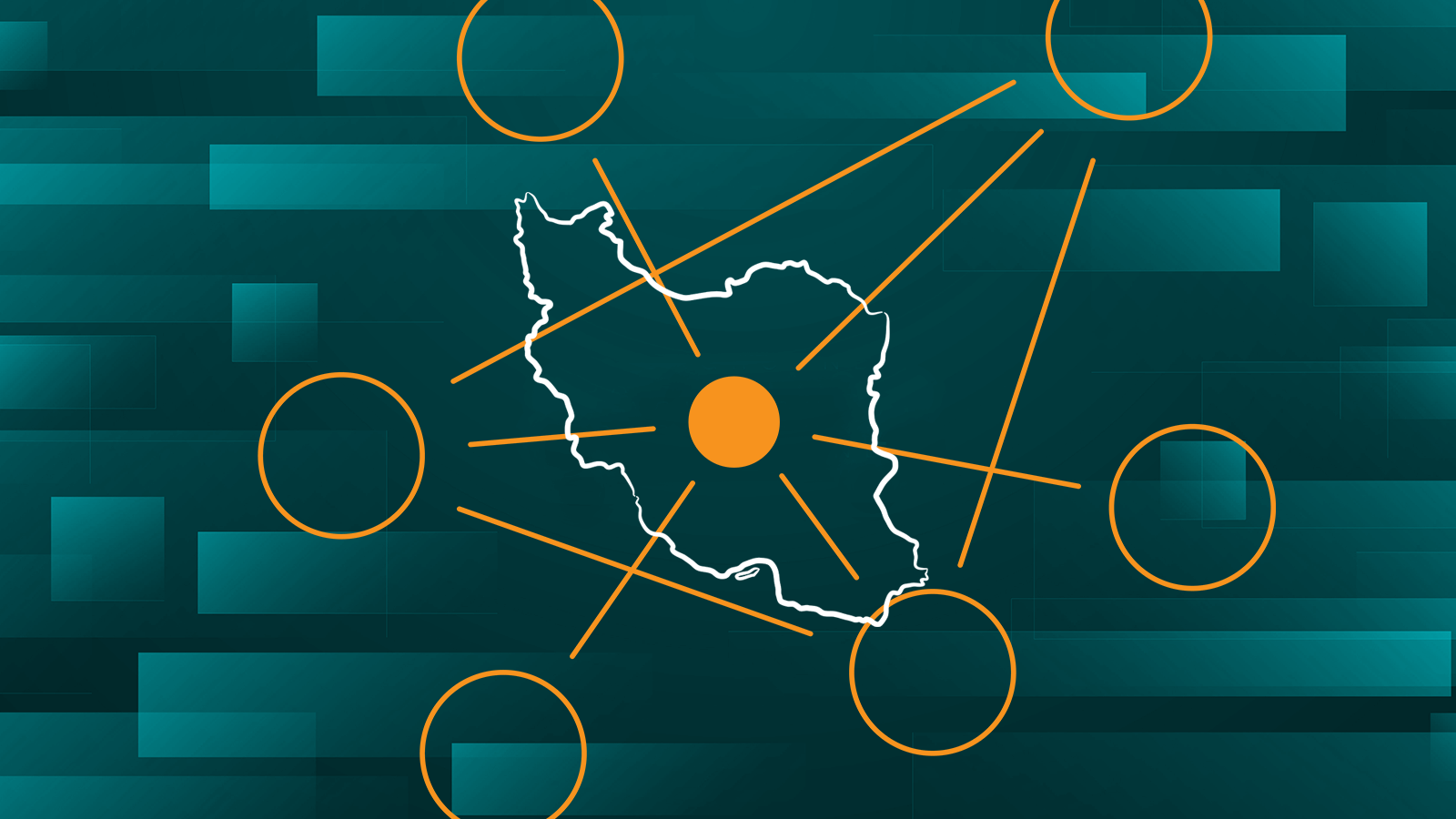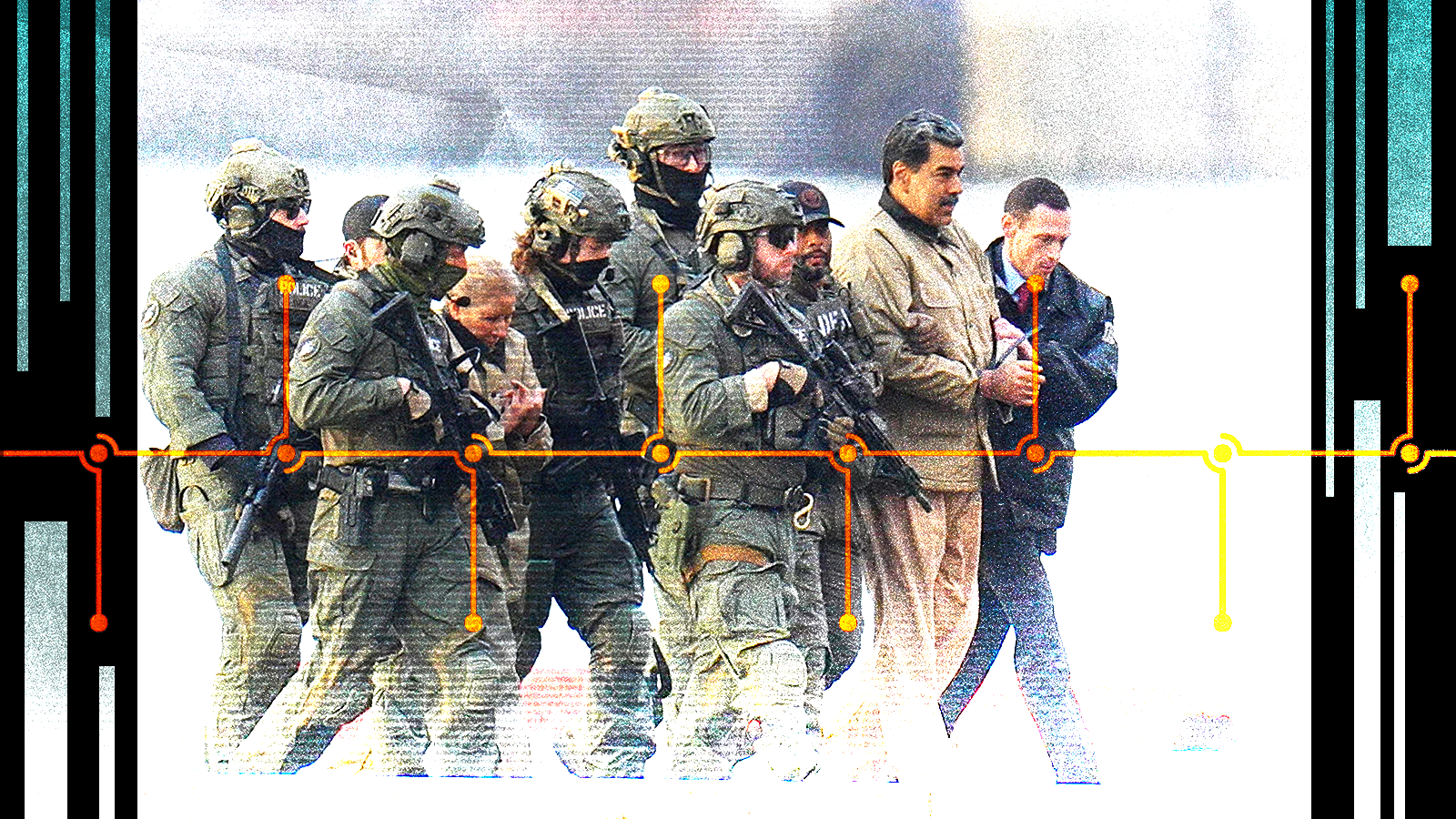Despite robust international sanctions, Iran has found ways to expand its technological reach and export critical technologies through the Iran House of Innovation and Technology (IHIT), a Kharon investigation shows.
The initiative, launched by the Iranian government, comprises a global network that assists Iranian companies in exporting dual-use technologies—goods that serve both civilian and military purposes. While IHIT helps promote Iranian products and foster export opportunities, there is also the danger that the broader network of companies surrounding IHIT could help Iran import dual-use items that benefit the regime’s military goals. In one instance, Kharon’s research found that an IHIT manager also owns a company that has collaborated with an Iranian center that the U.S. and EU sanctioned for procuring technology for Iran’s military and nuclear programs.
The rapid expansion of IHIT poses both a commercial risk for companies that may unknowingly engage with Iranian-linked firms and a national security risk for countries that allow businesses tied to Iran’s Ministry of Defense to operate within their borders. The Trump administration’s announcement last week reinstating a “maximum pressure” campaign against Iran means these kinds of networks will be coming under renewed scrutiny.
The origins of IHIT
In response to Western sanctions and growing global isolation, Iran’s economic policy has focused on what Ayatollah Khamenei, the country’s supreme leader, has called “the economy of resistance” to reduce dependence on oil exports and on the West more broadly.
As part of this strategy, Iran’s Vice Presidency for Science and Technology (VPST) and its operational arm, the Center for International Science and Technology Cooperation, developed the IHIT network to showcase Iranian technological achievements and foster export opportunities. IHIT’s goal, according to a 2024 Iranian Government Report, is to enhance Iran’s hardware infrastructure, support the commercialization of “knowledge-based” technologies and promote these technologies abroad.
These centers offer a variety of services, including dedicated workspaces, B2B meeting rooms, market research and export facilitation. IHIT also supports collaborations with export brokers and export management companies (EMCs) to help Iranian companies expand their reach into foreign markets. The organization plays a central role in supporting the country’s ambition of building a self-sustaining economy while circumventing international sanctions.
A global network
IHIT’s network has grown significantly in recent years, establishing branches in Russia, China, Türkiye and Kenya. The country has established the IHIT Market, an online marketplace that facilitates the movement of Iranian products—including industrial machinery, laboratory equipment, electronics and drones.
The initiative, launched by the Iranian government, comprises a global network that assists Iranian companies in exporting dual-use technologies—goods that serve both civilian and military purposes. While IHIT helps promote Iranian products and foster export opportunities, there is also the danger that the broader network of companies surrounding IHIT could help Iran import dual-use items that benefit the regime’s military goals. In one instance, Kharon’s research found that an IHIT manager also owns a company that has collaborated with an Iranian center that the U.S. and EU sanctioned for procuring technology for Iran’s military and nuclear programs.
The rapid expansion of IHIT poses both a commercial risk for companies that may unknowingly engage with Iranian-linked firms and a national security risk for countries that allow businesses tied to Iran’s Ministry of Defense to operate within their borders. The Trump administration’s announcement last week reinstating a “maximum pressure” campaign against Iran means these kinds of networks will be coming under renewed scrutiny.
The origins of IHIT
In response to Western sanctions and growing global isolation, Iran’s economic policy has focused on what Ayatollah Khamenei, the country’s supreme leader, has called “the economy of resistance” to reduce dependence on oil exports and on the West more broadly.
As part of this strategy, Iran’s Vice Presidency for Science and Technology (VPST) and its operational arm, the Center for International Science and Technology Cooperation, developed the IHIT network to showcase Iranian technological achievements and foster export opportunities. IHIT’s goal, according to a 2024 Iranian Government Report, is to enhance Iran’s hardware infrastructure, support the commercialization of “knowledge-based” technologies and promote these technologies abroad.
These centers offer a variety of services, including dedicated workspaces, B2B meeting rooms, market research and export facilitation. IHIT also supports collaborations with export brokers and export management companies (EMCs) to help Iranian companies expand their reach into foreign markets. The organization plays a central role in supporting the country’s ambition of building a self-sustaining economy while circumventing international sanctions.
A global network
IHIT’s network has grown significantly in recent years, establishing branches in Russia, China, Türkiye and Kenya. The country has established the IHIT Market, an online marketplace that facilitates the movement of Iranian products—including industrial machinery, laboratory equipment, electronics and drones.
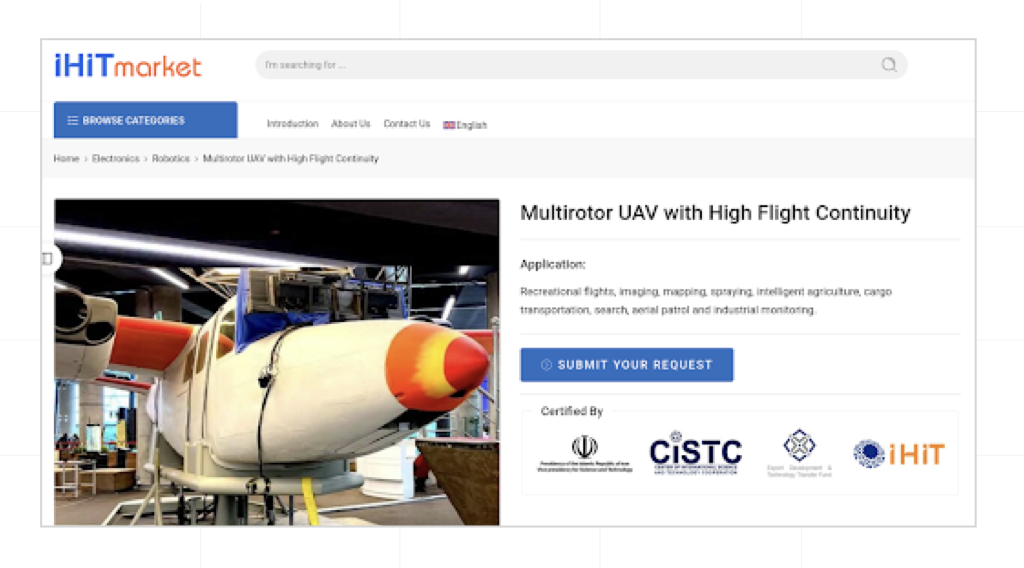
(Screenshot from the IHIT Market website)
IHIT’s global branches serve as intermediaries, helping Iranian companies bypass sanctions and conduct business in markets that do not face the same restrictions on trade with Iran.
For example, IHIT Russia, founded in 2021, operates as a private company owned by Iranian businessman Mahdi Deilam Salehi, according to corporate records. However, it is ultimately controlled by IHIT Iran.
The branch advertises itself as a facilitator for Iranian companies looking to operate in Russia, helping export Iranian goods and coordinate imports to Iran. In August 2024, IHIT Russia participated in the Russian military-technical forum alongside an Iranian defense official, which showcased recent UAV technologies and hosted representatives from Iran, highlighting its relationship with the defense sector. Last year IHIT Russia also took part in the Russian Oil and Gas Exhibition in Moscow, promoting Iranian-made products and providing networking opportunities for both Russian and Iranian companies.
According to its website, Salehi’s company, Amin Export Development and Technology Exchange, acts as the “exclusive agent” for IHIT in Russia, further linking the organization’s network to export businesses that specialize in facilitating the movement of goods between Iran and other countries.
For example, IHIT Russia, founded in 2021, operates as a private company owned by Iranian businessman Mahdi Deilam Salehi, according to corporate records. However, it is ultimately controlled by IHIT Iran.
The branch advertises itself as a facilitator for Iranian companies looking to operate in Russia, helping export Iranian goods and coordinate imports to Iran. In August 2024, IHIT Russia participated in the Russian military-technical forum alongside an Iranian defense official, which showcased recent UAV technologies and hosted representatives from Iran, highlighting its relationship with the defense sector. Last year IHIT Russia also took part in the Russian Oil and Gas Exhibition in Moscow, promoting Iranian-made products and providing networking opportunities for both Russian and Iranian companies.
According to its website, Salehi’s company, Amin Export Development and Technology Exchange, acts as the “exclusive agent” for IHIT in Russia, further linking the organization’s network to export businesses that specialize in facilitating the movement of goods between Iran and other countries.
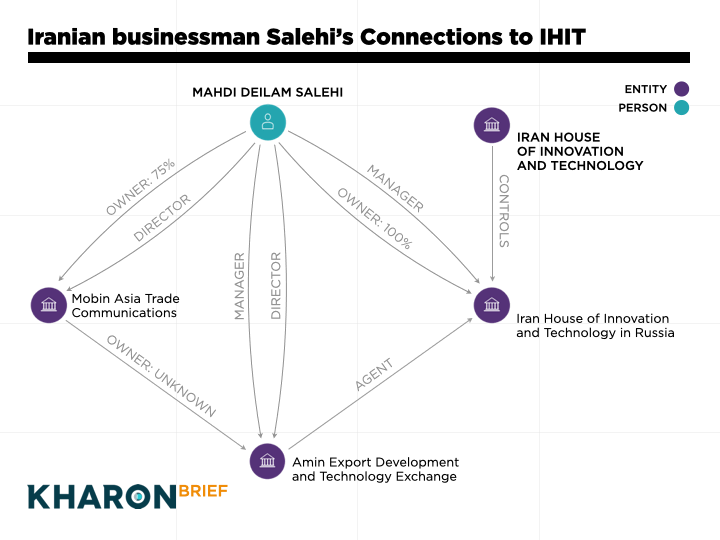
Kharon users can explore this Insight in greater detail through the ClearView platform.
IHIT’s connections with its international branches often go beyond trade. For example, Amin Export Development Co’s Kenya branch shares office space with an IHIT outpost in the country and frequently collaborates with IHIT Russia to organize trade events.
The German connection and the role of export brokers
IHIT does not operate in isolation; its network includes export brokers—private companies that can help Iranian businesses export goods and circumvent sanctions. These brokers often have connections with government-backed institutions like the VPST and the Ministry of Defense. Export brokers can facilitate the movement of sensitive technologies, including drones, missile parts and electronic systems, to various international markets, sometimes through third-party countries.
These brokers have helped expand IHIT’s network into Europe. Rhyton Solutions, a German-based AI and data management firm, is majority-owned by Masoud Hassani, who also manages IHIT’s Istanbul branch. Rhyton is controlled by Ritone Iran, an Iranian firm involved in various export activities, including facilitating Iranian technology exports to Russia. In 2020, a Tehran-based tech-industry group highlighted an article by Hassani promoting the software industry as “one of the most favorable industries of the country for exports under the conditions of sanctions pressure.”
The German connection and the role of export brokers
IHIT does not operate in isolation; its network includes export brokers—private companies that can help Iranian businesses export goods and circumvent sanctions. These brokers often have connections with government-backed institutions like the VPST and the Ministry of Defense. Export brokers can facilitate the movement of sensitive technologies, including drones, missile parts and electronic systems, to various international markets, sometimes through third-party countries.
These brokers have helped expand IHIT’s network into Europe. Rhyton Solutions, a German-based AI and data management firm, is majority-owned by Masoud Hassani, who also manages IHIT’s Istanbul branch. Rhyton is controlled by Ritone Iran, an Iranian firm involved in various export activities, including facilitating Iranian technology exports to Russia. In 2020, a Tehran-based tech-industry group highlighted an article by Hassani promoting the software industry as “one of the most favorable industries of the country for exports under the conditions of sanctions pressure.”
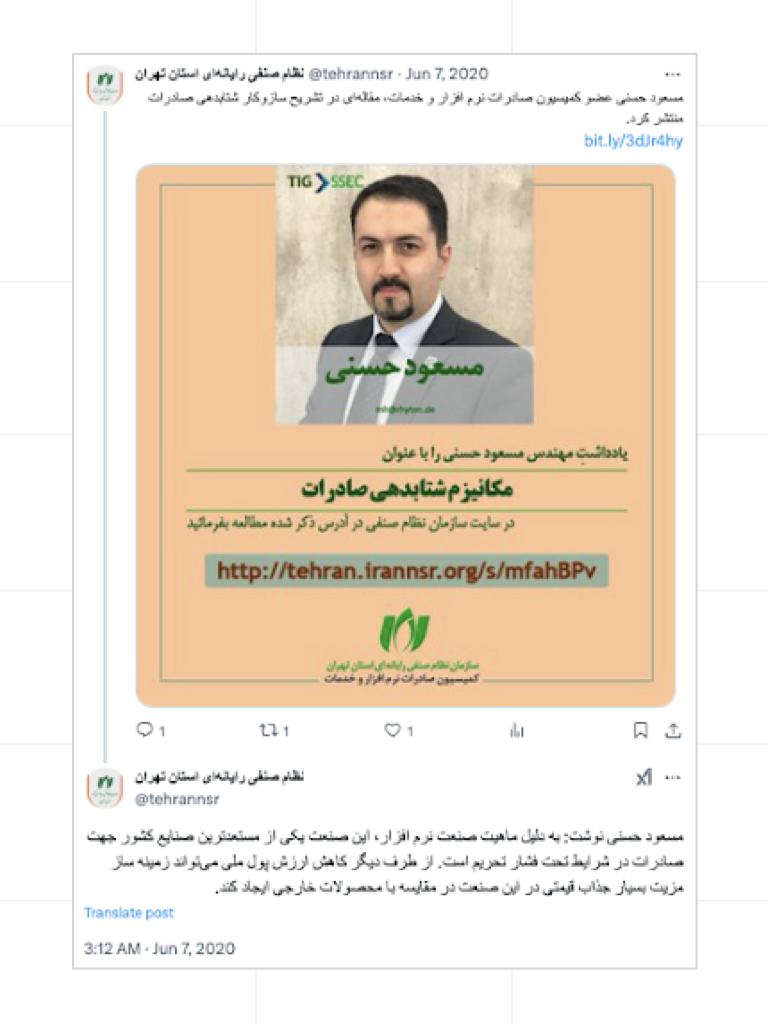
A post by the Tehran ICT Guild highlighting Hassani’s article.
Rhyton’s activities highlight the use of third-party countries to move sensitive technologies while circumventing Western authorities. Its involvement in trade events in Russia underscores how Iranian-linked companies can operate under the radar in countries with fewer restrictions on trade with Iran.
Ritone also has ties to other Iranian entities, including the Center for Progress and Development of Iran, which the U.S. Department of the Treasury sanctioned for supporting Iran’s nuclear and military programs.
Ritone also has ties to other Iranian entities, including the Center for Progress and Development of Iran, which the U.S. Department of the Treasury sanctioned for supporting Iran’s nuclear and military programs.
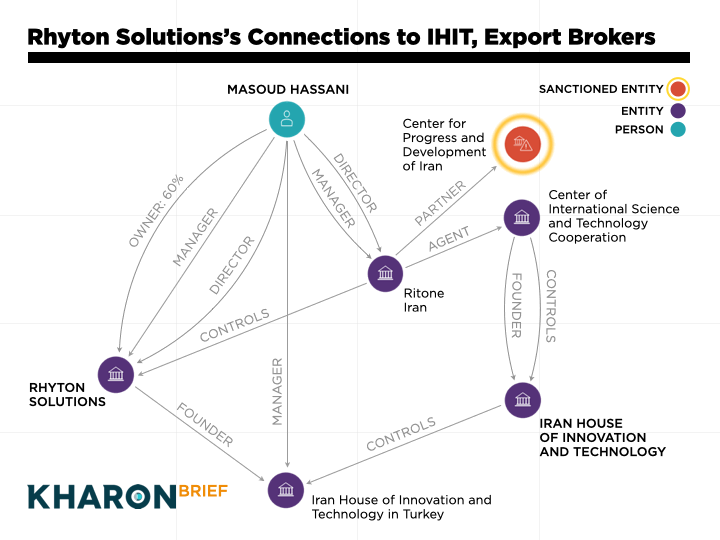
Kharon users can explore this Insight in greater detail through the ClearView platform.
Another example is Hirad Smart Trading Co., an import/export firm based in Tehran whose managing director is the business manager for IHIT Russia. The company helps market Iranian products and technologies. In a November 2024 post on its website, Hirad highlighted the growing demand for imported electronics to support the country’s expanding industries, including defense. The post also advertised that, “as a specialized trading company, [Hirad Smart Trading] is able to supply, clear, and deliver your desired [electronics] parts from different countries.”
Business and security concerns
Despite ongoing Western sanctions, the Iranian government continues to seek ways to acquire and develop military-grade technologies. Through IHITs and affiliated export brokers, the Iranian VPST has created a growing network to facilitate the export and acquisition of dual-use goods via third countries.
The U.S. renewal of maximum pressure may heighten the risks around Iranian ties for financial institutions and businesses. Companies can protect against deceptive practices by assessing whether their existing protocols—including people, data and technology—are sufficient.
More on Iran:
Business and security concerns
Despite ongoing Western sanctions, the Iranian government continues to seek ways to acquire and develop military-grade technologies. Through IHITs and affiliated export brokers, the Iranian VPST has created a growing network to facilitate the export and acquisition of dual-use goods via third countries.
The U.S. renewal of maximum pressure may heighten the risks around Iranian ties for financial institutions and businesses. Companies can protect against deceptive practices by assessing whether their existing protocols—including people, data and technology—are sufficient.
More on Iran:



